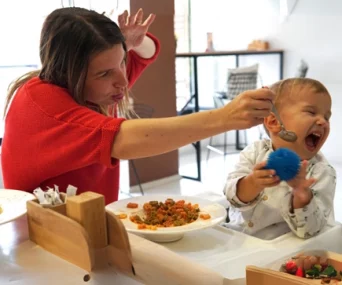Picky eating is a common problem among children of all ages, and it can be a source of constant frustration for both parents and pediatricians. Fortunately, there is a solution: pediatric feeding therapy. Through food chaining, a form of therapy developed to help picky eaters expand their diets, children can learn to eat a variety of foods.
Food chaining is a form of occupational therapy that works by introducing a new food to the picky eater in a way that is familiar and non-threatening. The therapist will start by introducing foods that the child already eats, and then add a small amount of the new food to the plate. The therapist might also suggest creative ways to prepare the food, such as adding a topping or dipping it in a sauce.
Once the child becomes comfortable with the new food, the therapist will gradually increase the amount of the new food on the plate until the child is eating a balanced meal. This method helps children to become used to the food in a safe and non-threatening way, and can be combined with other therapeutic techniques such as positive reinforcement.
The key to success with food chaining is to take small steps and be consistent. It can take several weeks or even months before a picky eater is comfortable with a new food. Parents should also be aware that it is not uncommon for children to initially reject a new food, only to later accept it with repeated exposure.
Food chaining is a very effective way to help picky eaters expand their diets. By introducing new foods in a familiar and non-threatening way, children can learn to eat a variety of foods. This in turn can lead to healthier eating habits and improved nutrition. With patience, consistency, and the help of a qualified therapist in feeding therapy for children, food chaining can help picky eaters learn to enjoy a variety of foods.
Among the services we provide at Hope AMC is pediatric feeding therapy. We have a specialized team of Paediatric Speech and Language therapists who will help your child to overcome his or her weaknesses or difficulties in feeding and or swallowing and make sure everything is done in a safe way so that your child gets the maximum benefit from the pediatric feeding therapy.
The pediatric feeding therapy specialists suggest an appropriate Feeding Therapy plan after assessing the child’s condition, age, cognitive and physical abilities, and specific issues. In addition to supporting hydration and nutrition, reducing the risk of pulmonary problems, facilitating oral or pharyngeal or respiratory coordination, and modifying behavioral and sensory issues, we focus on the following areas based on the individual child’s condition.






